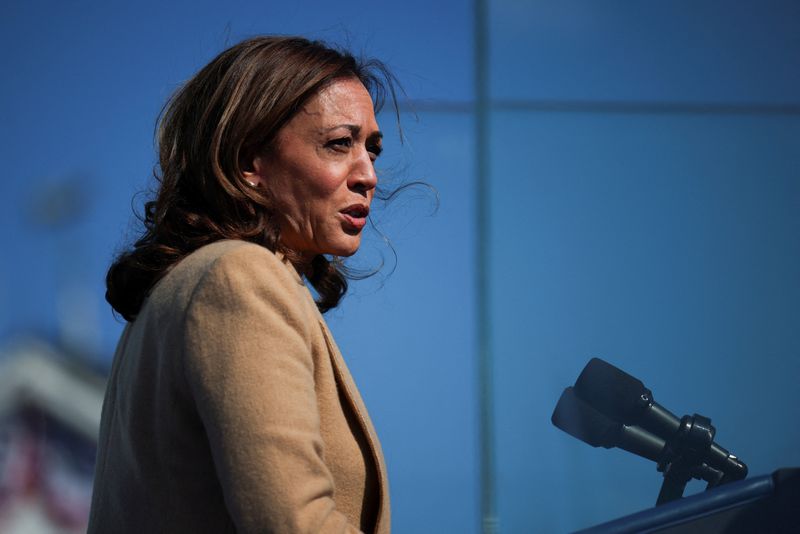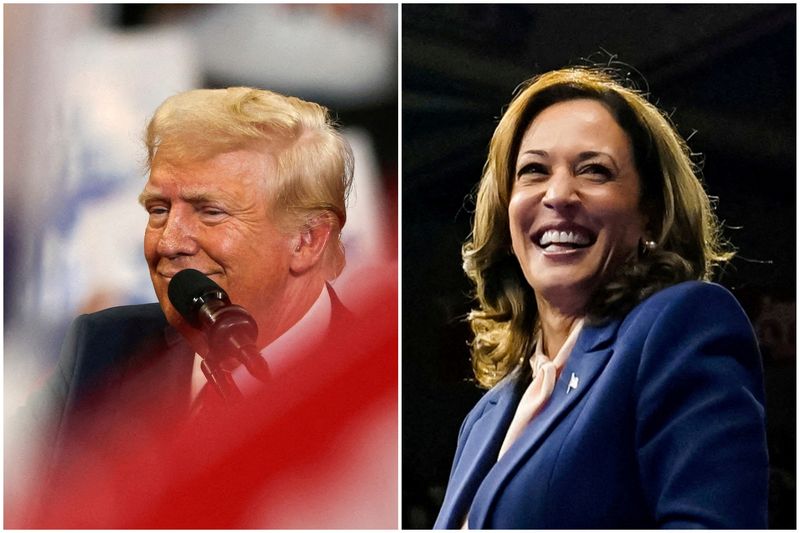By David Lawder
WASHINGTON (Reuters) - Vice President Kamala Harris and Republican opponent Donald Trump have floated new tax breaks and spending plans, as they try to win votes by persuading Americans their ideas will do more to ease their financial burdens.
Budget forecasters are struggling to keep up with the latest tweaks, and new ideas may be voiced in Tuesday's Harris-Trump debate, but so far all estimates show Trump's agenda piling up much more new federal debt.
Trump has said he plans to extend all tax cuts he pushed through Congress in 2017, exempt Social Security and tip income from taxes, and further cut corporate income taxes.
These changes would likely add $3.6 trillion to $6.6 trillion to primary U.S. deficits over 10 years, according to published individual and comprehensive estimates from four budget forecasters reviewed by Reuters: the Penn-Wharton Budget Model, the Committee for a Responsible Federal Budget (CRFB), the Tax Foundation and Oxford Economics.
Harris' plans, which include expanding the Child Tax Credit, a $6,000 bonus tax credit for newborns, a $25,000 first-time homebuyer tax credit, and no taxes on tips, could reduce deficits by as much as $400 billion or add up to $1.4 trillion to deficits over a decade, the same forecasters calculated.
The estimates are based on static budget scoring, and are compared against the Congressional Budget Office's current-law "baseline," which already assumes a massive, $22 trillion increase in debt through 2034.
ROLLING ANALYSIS
The forecasts vary considerably depending on which ideas mentioned on the campaign trail are included.
Estimates of Harris’ recently rolled-out tax deduction of up to $50,000 for business startup costs, and a lower top capital gains tax than the one proposed by President Joe Biden are largely not included.
The forecasts include Trump’s proposal to lower the corporate income tax to 15% from 21% but not his latest comments that this rate would be reserved only for companies that produce their goods in the U.S.
"The campaign talking points are moving faster than the budget models," said Shai Akabas, economic policy director for the Bipartisan Policy Center. "I think we're largely seeing what we've come to expect in recent years, which is that candidates are going to put their popular policy priorities ahead of fiscal responsibility on both sides."
Congress must approve tax and spending legislation, making it difficult for the winner of the Nov. 5 election to achieve their priorities without sweeping majorities in both the Senate and the House of Representatives.
2025 TAX CLIFF
The major differentiator between Trump and Harris is how they address the 2025 expiration of individual tax cuts passed by Republicans during Trump's presidency in 2017. Without action by Congress, these rates would snap back to their previous, higher levels.
Trump has pledged to permanently extend all of the expiring tax cuts, including for the wealthiest Americans, which tax and budget experts estimate would reduce revenues over a decade by about $3.3 trillion to $4 trillion.
Harris would extend the 2017 tax cuts for only those earning under $400,000, keeping a Biden pledge, but this would add up to $2.5 trillion to a spending agenda already estimated at $2 trillion over a decade.
Harris has quietly endorsed the nearly $5 trillion in tax hikes in Biden's fiscal 2025 budget request, including taxing unrealized gains from fortunes over $100 billion and raising the corporate tax rate to 28%
This has caused consternation on Wall Street but would substantially offset the cost of her spending plans.
"I think the conclusion that Trump's approach to taxes is more debt-fueled is correct," said Steve Rosenthal, a senior fellow at the Urban-Brookings Tax Policy Center. "I say that because Harris at least has some pretty well-developed revenue raisers."
Trump has not offered any conventional tax increases to offset his extended tax cuts. Other breaks, including exempting Social Security income, would reduce revenue by $1.6 trillion, CRFB and the Tax Foundation estimate.
The conservative-leaning Tax Foundation called the move "unsound and fiscally irresponsible," weakening Social Security and Medicare.
Trump has said his tax cuts would be paid for with "trillions of dollars" generated by stronger economic growth, new import tariffs, ending Biden's clean energy subsidies and a new government efficiency commission headed by billionaire entrepreneur and Tesla (NASDAQ:TSLA) CEO Elon Musk.

The Tax Policy Center has estimated that Trump's proposed 10% global tariff and 60% tariff on Chinese imports could raise up to $3.8 trillion over a decade but would reduce other revenues due to its economic effects, including imposing a de facto tax on households.
The Tax Foundation was the only model reviewed that included a tariff estimate as an offset -- $2.6 trillion -- but even then, it estimated that Trump's plans would boost deficits by nearly $4 trillion over a decade.
